The Atlantic Philanthropies-University of Queensland Vietnamese Scholarship Programme Experience: Stepping Stone and Personal Transformation
Resource type: News
The Association of Commonwealth Universities Blog | [ View Original Source (opens in new window) ]
By Trevor Grigg
The scholarship programme and its objectives
Over the period 2000 to 2006, The Atlantic Philanthropies (AP) funded The University of Queensland’s Vietnam Coursework Masters and Doctoral Development Scholarship Programs, with grants totalling AUD 17 million.
The primary objective of the programmes was: ‘to contribute to the sustainable development of Vietnam through education and training initiatives that enhanced the knowledge, competitiveness and skills of talented young professionals’. The declared expectation was that…’on returning to Vietnam the scholarship recipients would make an enhanced contribution to the economic and social development of the nation.’
In total, there were 205 Coursework Masters Scholarships, including 28 in a dedicated pool in the field of public health, and 49 Doctoral Development Scholarships awarded to young Vietnamese professionals and university academics. The programmes comprised up to five annual cohorts from each of the three regions of Vietnam: north, central and south. This article is focused on the coursework masters.
Under the Coursework Masters Scholarship Program (CMSP), scholarships were awarded for up to two years to support individual study at The University of Queensland (UQ). The scholarships covered travel to and from Australia, coursework tuition, English language training fees, and a stipend for living expenses for the duration of study in Vietnam and Australia.
The CMSP was open to Vietnamese citizens employed in any sector – government, non-government, higher education or private/corporate sector. Applicants could apply to study in any field or discipline offered at coursework masters level at UQ, apart from the dedicated public health pool. Applicants were required to have a minimum of two years’ relevant work experience after graduating from a Vietnamese university. Applications from those located in disadvantaged provinces were encouraged. A principal condition of the scholarship was that scholarship recipients return to Vietnam on completion of their programme of study.
Unique features of the scholarship programme
The CMSP had a number of unique features when compared to other overseas scholarship schemes, including that the programme:
- was developed at the invitation of a private USA-based philanthropic organisation, by an Australian public university
- had a human resource capacity building objective, but no diplomacy objective
- was for one country’s citizens and that country was a communist state
- was for coursework masters study at only one university
- was open to eligible applicants from all employment sectors and not confined to applicants employed by government or public universities
- required applicants to self-nominate
- had no government involvement in the application or selection process
The evaluation study
I was invited by AP in late 2015, some 10 to 15 years after the programme had ended, to evaluate the beneficial impacts of the programme on the lives and careers of participants, on the organisations within which they now are employed or have created, and on their community and nation.
The design of the evaluation framework was based on a categorisation of beneficial impacts along two dimensions, namely:
- those private benefits enjoyed by the scholarship holders, as distinct from the public benefits flowing to the community and country at large
- those benefits which are economic in nature, as distinct from those that are non-economic or social in nature
Examples of the anticipated beneficial impacts under each of the four categories is shown in the table below. This categorisation is one that has underpinned much recent research on the benefits of higher education at a national and state level, in developed economies.
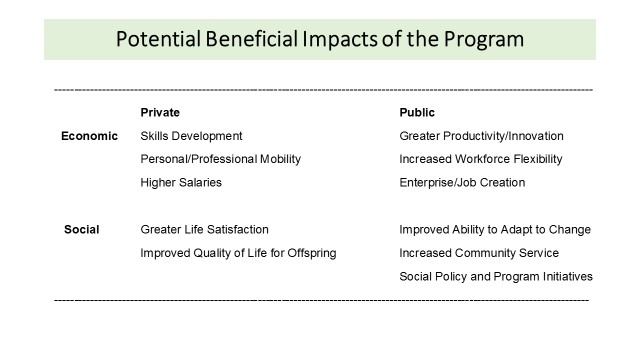
The evaluation study was conducted by means of an online survey of the scholarship alumni and interviews with selected alumni, their employers and peers. Starting with only a list of the names of the scholarship participants, the study was able to gain the participation of 41% of the 205 participants (59% of those who clicked on the survey link) through extensive use of social media and formal and informal alumni networks; 26 interviews were conducted with alumni, the majority face-to-face in Vietnam.
Details of the study methodology and findings are contained within the study report The Atlantic Philanthropies-University of Queensland Vietnamese Scholarship Program 2000-2006: Assessing the Impact, which is available on the AP website
Evaluation findings
It is not possible to report on all of the findings of the evaluation study in this blog. Rather, I will focus on a number of noteworthy findings and others where further examination of the issues raised is recommended. These include the personal transformations experienced by participants in scholarship schemes and the common occurrence of relocation by participants away from the country of origin (‘brain drain’) some time after completing the scholarship programme.
Perceived gains from the CMSP
The alumni who participated in the survey responded very positively about their CMSP experience, reporting that their goals and expectations had been met or exceeded. Their perceived gains from the programme in nine areas are summarised in the table below, which shows the mean score for each area on a 5 point Likert scale, where a score of 1 indicates strongly disagree and a score of 5 indicates strongly agree. The responses demonstrate a perception of agreed gains, on average, across all areas.
Also shown in the table are the mean scores reported by the alumni of the Commonwealth Scholarship Commissionwhen posed the same questions. The degree of comparability in the responses by the two alumni communities is striking. Is the close similarity of the responses reflective of a commonality of participants’ perceived personal gains in such scholarship schemes? This is worthy of further study across other scholarship alumni cohorts.
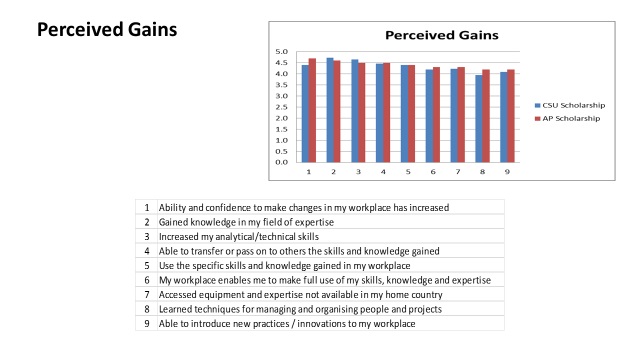
Contribution to career and society
A majority of the CMSP alumni reported that on return to Vietnam they enjoyed salary increases and promotions within a year of returning, and now enjoyed more senior roles in Government, universities, NGOs, and the private sector.
The alumni indicated that the CMSP had made an important/the most important contribution to their career advancement as shown below.
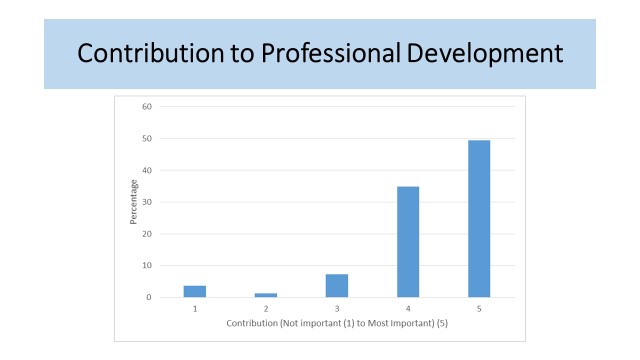
Significantly, the alumni reported that the CMSP had enabled a significant number of them to effect change at not only the institutional level, but also at the local and national level.
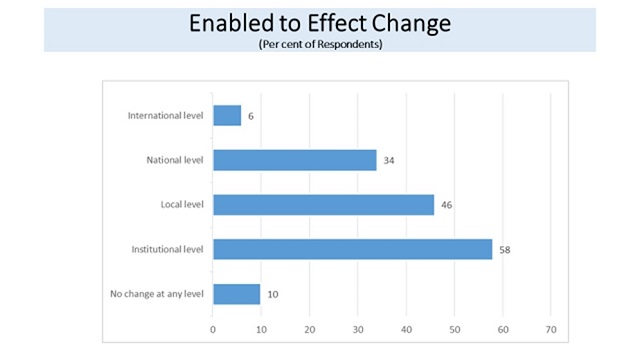
The survey responses also revealed that the alumni:
– had been involved in development projects in a wide range of areas, and at a significant level in projects that have impacted on socioeconomic development in Vietnam
– had influenced local, provincial and government policy in Vietnam in a range of development areas
Personal transformation
The evaluation team were aware that in other scholarship scheme evaluations the recipients of the scholarships often commented their lives had been transformed by the experience. It was anticipated that this would also be the case for the CMSP. Consequently, when designing the survey, a number of questions were included which sought to measure aspects of any transformation that may have occurred. These questions were constructed specifically for this evaluation. The questions were:
– What has been the most significant impact on you from your participation in the AP UQ Coursework Masters Scholarship Program?
– As a result of your AP UQ Scholarship Program:
- Have you increased your level of participation in community based organisations?
- Have you increased your level of influence in the community and civil society?
- Have you increased your level of self-confidence as evidenced, in part, by your willingness to take the initiative and to take the risk?
- Has your life satisfaction increased?
- Has the quality of life of your offspring (if any) and family members increased?
The responses to the first question, included the following comments:
– ‘the most significant and rewarding period of my life’
– ‘changed my life completely’
– ‘my overall life satisfaction has increased immensely
– ‘confident and positive about my life in the future’
For the second set of questions, survey participants were asked to rate their response to each question on a ten point Likert Scale where, for the questions concerning ‘level of participation’, ‘level of influence’ and ‘level of self-confidence’, no increase is scored as 1 and very high increase is scored as 10. For the questions concerning ‘life satisfaction’ and ‘quality of life’, not at all is scored as 1 and a great deal is scored as 10.
The alumni indicated by their responses that their overall level of ‘life satisfaction’, ‘self-confidence’ and ‘quality of life of offspring and family’ had increased highly as a result of the AP UQ Scholarship Program. The behavioral change associated with a high increase in their ‘level of self-confidence as evidenced, in part, by their willingness to take initiative and to take risk’, is particularly worthy of note. The distribution of rating scores in response to this question are shown in the table below.
These responses indicate a significant change in behavior – a major personal transformation – since completing the CMSP.
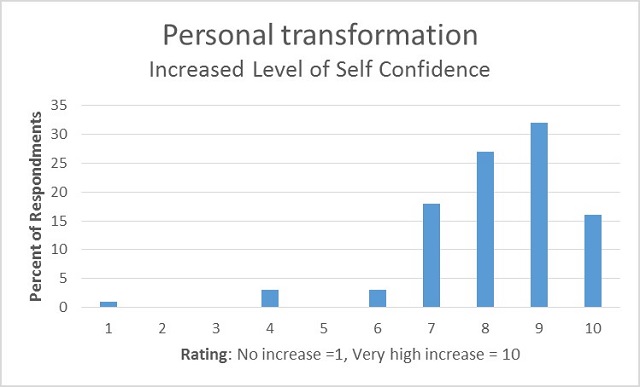
Both ‘influence on civil society’ and ‘participation in community-based organisations’, with median scores of 7, were not rated as highly as personal transformations resulting from their participation in the CMSP.
The personal transformations reported in the survey were noted first hand during the face-to-face interviews, as the alumni recounted with pride and enthusiasm their achievements and contributions since undertaking the DDP.
The personal transformations experienced by scholarship alumni, such as those in the CMSP, is an area of evaluation studies worthy of closer analysis. It is hoped that the questions posed in this study to explore the nature of these personal transformations contribute to better mapping of these impacts in future studies.
Exodus from the Government sector
Of those who were originally employed in the government sector, only half now remain employed in that sector – with 35% now being employed in the private sector and a further 15% in the non-government sector. This reflects, in part, the changing nature of the Vietnamese economy since the CMSP was offered, as the private sector has been progressively opened up in Vietnam during and since that time. However, as revealed in the face-to-face interviews, this also reflected a desire by many alumni to move out of a work culture within Government, which they reported was constraining their ability and eagerness to take full advantage of the knowledge, skills and experience they had acquired during their CMSP studies. Of those surveyed, only one alumni had moved into the government sector since completing their CMSP.
This movement of highly qualified, overseas educated, young professionals from the Government sector is potentially of concern at a time when Vietnam is undergoing major economic reforms, reforms which also result in many social adjustment challenges and issues, demanding the attention of government and the development of sound public policy responses. On the other hand, alumni who have moved into other sectors are making their contribution by way of building the future economic base of the country.
Higher degree studies
The CMSP has been the stepping stone for 48% of the alumni to undertake PhD studies, with 94% of them being awarded a degree at an overseas university – 62% at an Australian university. These studies were all supported by scholarships; this was not anticipated. This outcome has significantly enhanced the human resource capacity building objectives of the CMSP.
Those alumni who have obtained a PhD acknowledge the significant contribution that the CMSP had made to making this possible. (Contribution median score of 9 on a 10 point Likert Scale, where 1 was a rating of no contribution and 10 a rating of very high contribution).
Of these PhD qualified alumni, 45% are currently employed within universities, 20% in NGOs, and 15% in the private sector.
Relocation overseas – a ‘brain drain’
That 30% of the alumni who participated in the CMSP are now residing overseas, with 44% of them resident in Australia, was also an unanticipated outcome of the study. For the alumni with a PhD, 40% now reside overseas compared with 21% of the alumni who have not undertaken PhD studies. However, those who undertook studies in public health during their CMSP differ significantly from the average, with only 12% now residing overseas. These alumni are employed in a sector of great need in Vietnam at this time in its history.
The future plans of alumni currently residing overseas, with respect to whether they will return to Vietnam at some time in the future, are not known. How long they have been overseas is also not known.
That these CMSP alumni are now residing overseas does not necessarily represent a ‘brain drain’ for Vietnam. They may well be engaged in activities which have strong economic and social ties with Vietnam, and may be instrumental in creating investment and employment multiplier impacts within Vietnam now or in the future.
The economic and social impact of this outward migration of highly educated professionals on Vietnam is worthy of further investigation, but was beyond the scope and resources of the study.
It is an issue of some importance for schemes such as the CMSP which have a primary objective to build human resource capacity for the benefit of not only the scholarships’ recipients, but also the community and nation within which they initially resided.
Conclusion
The evaluation study concluded that the human resource capacity building objective of the CMSP had been met, and that the scholarship recipients were making an enhanced contribution to the economic and social development of their nation.
The study highlighted the need for further research on the impact of the so-called ‘brain drain’ on the longer term beneficial impacts of scholarship programmes, such as the CMSP, on the target nation. The study also noted the potential value of further study into the personal transformations experienced by alumni after participating in such scholarship schemes, building on the analysis undertaken in this study.
Emeritus Professor Trevor Grigg is a Company Director and Consultant. He was the Deputy Vice-Chancellor and Vice President (International and Development) at The University of Queensland from 2000 to 2009, and has held prior senior academic appointments as a Pro-Vice Chancellor (Academic) and Executive Dean of a Business Faculty.
He has acted as a specialist consultant to more than 40 public and private sector clients, advising on strategic planning, business strategy, public policy and public infrastructure planning, and investment-related issues. He has been a director on almost 20 boards, including that of research and development companies, research commercialisation companies, an international education company, a university governing council, and a geothermal energy research centre.
He was awarded a Certificate of Merit by the Da Nang People’s Committee of the Socialist Republic of Vietnam in 2005 for ‘active and effective contribution to the socio-economic development of Da Nang City’ (Ref. No.146/KT).
He was the Project Director of the evaluation study reported in this article.
University of Queensland is an Atlantic grantee.